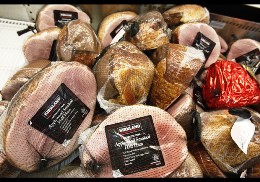those generic labels we often equate with bargain quality—are among the fastest growing and most popular items for sale today.They provide more choices, help us save money and have come a long way from the bottom-shelf,hokey-labeled products from decades past. But not all store brands are created equal.You may be surprised to learn that an in-house brand isn’t always what it seems.

A typical generic product (also called “private label”) yields a higher profit for the store,even when it sells for a lot less than the similar national brand. That’s because there are no marketing or advertising costs involved and why companies invest a good amount of money in creating private labels. Name-brand consumers pay for those Superbowl ads in the form of higher per item prices.
“Private label provides value and it’s higher margin,” says Natalie Berg,Global Research Director at Planet Retail, a retail intelligence agency in London. “In a down economy, it really ticks two boxes—boosts the bottom line and drives loyalty.”
It’s a common misconception that private label products are just the better known brand with a different coat of paint. Not true. There are dozens of small companies dedicated solely to developing store brands and they work directly with the retailer to develop the item, label and price points. Even when an item is made by a large well-known brand, it’s not exactly the same. If a big brand like Heinz or Hunts decided to sell private label, it will make soup or pasta sauce, not ketchup. Companies want to expand their business, not destroy the existing one.
Perhaps most surprising is the number of house brands in the market that we don’t even know are private label. Take White Cloud, for example. Once a widely available national brand of toilet paper, White Cloud is now sold exclusively at Walmart stores. Rock & Republic, a premium denim line available at luxury retailers like Neiman Marcus, will soon be a store brand (as of Spring 2012, it will be sold exclusively at Kohl’s).
The bottom line is that store brands will save you money. A recent study from the Private Label Manufacturers Association found that consumers save an average of 33 percent on the total grocery bill by buying store brands. While most of us don’t exclusively buy private label products, increasing the number of store brands in our shopping basket will have a noticeable impact at the cash register.
1 Not Just A Cheap Alternative
Store brands are not only the value option, they can be premium and specialty items. Private label organic options and ethnic foods are among the fastest growing product categories,representing value and high quality while offering something unique to the store.
2 Designer Private Labels
Those "exclusive partnerships" between a famous designer and retail chain are actually new store brands. Simply Vera by Vera Wang at Kohl's and Michael Graves kitchen accessories at Target are manufactured for, and sold exclusively at those stores.
3 Rising Above
Sometimes store brands transcend their limited availability and become national brands. Martha Stewart once had products only available at Kmart, but today sells a variety of lines at multiple retail outlets including her own web site. Sears Craftsman tools, Die Hard batteries and Kenmore appliances are store brands with arguably more cache and shopper loyalty than the store that started them. Store brands from Safeway like O Organics and the Eating Right labels are sold at other supermarkets,mostly in markets where Safeway doesn’t have stores.
4 Inspiring Loyalty
Many shoppers express devotion to store brands above all others. Costco, Trader Joe's and Aldi, carry a higher proportion of store brands than other chains. And this is exactly why shoppers keep coming back.
5 Store Brand Camouflage
Using fancy packaging and strategic titling, retailers sometimes make it difficult to spot the store brand. Look at the label to see who the item is distributed by or for. Often the item will have the store's name or headquarters location--like Target's in Minneapolis.